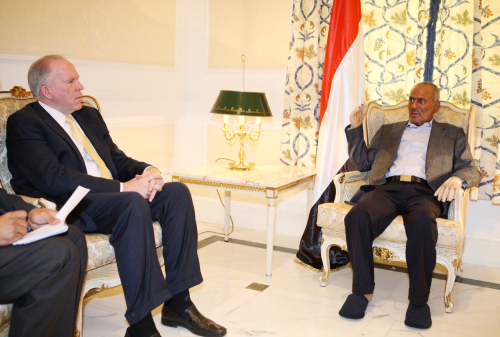White House says assistance will flow to Yemen once power transfer is complete
SANAA (AP) ― Yemeni President Ali Abdullah Saleh must “expeditiously” sign a deal that would have him transfer power to his vice president and step down, the White House counterterrorism chief told Saleh in a meeting at a hospital where the Yemeni leader is being treated for serious injuries.
It was the strongest and most public sign yet of U.S. pressure on Saleh, whose rule is being challenged by a five-month-old popular uprising. Yemen’s president has promised several times in the past to sign the deal, brokered by Gulf Arab countries led by staunch U.S. ally Saudi Arabia, then balked at the last minute.
White House envoy John Brennan met Saleh at a hospital in Saudi Arabia where Saleh is recovering from wounds sustained in a June 3 attack on his presidential compound in Sanaa, the Yemeni capital.
The White House said Brennan urged Saleh to sign the transfer-of-power agreement “expeditiously.” Brennan also told Saleh, Yemen’s leader of nearly 33 years, that “assistance will flow to Yemen” when the deal is signed and implemented.
“The United States believes that a transition in Yemen should begin immediately so that the Yemeni people can realize their aspirations,” the White House statement said.
The deal was brokered by the Gulf Cooperation Council, a loose alliance of six, U.S.-backed Gulf nations that have often looked with concern at the turmoil in Yemen, their poor neighbor on the southern corner of the Arabian Peninsula.
 |
Yemen’s President Ali Abdullah Saleh (right) meets top U.S. counterterrorism official John Brennan in a hospital in Saudi Arabia on Sunday. (AFP-Yonhap News) |
Under the agreement, Saleh would be granted immunity from prosecution.
The proposal has been rejected by anti-government protesters who have staged massive demonstrations across the nation since February to force Saleh out of office. They insist that Saleh must step down immediately and unconditionally.
Brennan, according to a White House statement, told Saleh that resolving the political crisis in his country was important so that the nation can face its serious challenges, “including the terrorist attacks carried out by al-Qaida in the Arabian Peninsula, which have claimed the lives of hundreds of Yemeni citizens.”
An official statement in Sanaa said Saleh told his American visitor that any transfer of power in Yemen must be carried out in a democratic framework and under the guidance of the constitution, suggesting a gradual process he wants to oversee.
It said Saleh told Brennan that the Gulf proposals provided the “basis” for resolving his country’s political crisis through a national dialogue, language that suggests the Yemeni leader has not agreed to adopt the document.
Sunday’s meeting took place against the backdrop of a rising threat by al-Qaida-linked militants in the nearly lawless south of the country. The militants have taken advantage of the turmoil of the uprising against Saleh to flex their muscles, capturing and holding territory in areas of the south, including a provincial capital close to the strategic port city of Aden on the Arabian Sea.
Brennan’s visit also appeared to reflect Washington’s concerns about the growing strength of Islamic militants in Yemen, which is close to the Gulf’s vast oil fields and strategic shipping lanes in the Arabian and Red seas.
Yemen is also home to one of the most active al-Qaida branches ― al-Qaida in the Arabian Peninsula ― which has been linked to several failed attacks on U.S. targets, including the plot to bomb a Detroit-bound airliner in December 2009. The group also put sophisticated bombs into U.S.-addressed parcels that made it onto cargo flights.
U.S.-born Muslim cleric Anwar al-Awlaki, whom the United States has put on a kill-or-capture list, also found refuge in Yemen. Washington accuses him of inspiring attacks on the U.S., including the 2009 shooting at a military base in Texas that killed 13 people.
Anticipating worsening conditions in Yemen, the United States is building a secret CIA air base in the Persian Gulf region to target al-Qaida terrorists in case anti-American groups emerge victorious from the country’s current political impasse and shut U.S. forces out, the Associated Press learned last month.
The AP also learned that the White House has increased the number of CIA officers in Yemen and stepped up the schedule to construct the base, from a two-year timetable to eight months.
The new base suggests a long-term U.S. commitment to fighting al-Qaida in the region, along the lines of the model used in Pakistan, where CIA drones hunt militants with tacit approval from the Yemeni government.
Saleh, who is nearly 70, seemed more energetic Sunday than when he was shown on TV several days ago for the first time since the attack, appearing rigid and weak. His earlier appearance had fueled more speculation about his condition and his political future.








